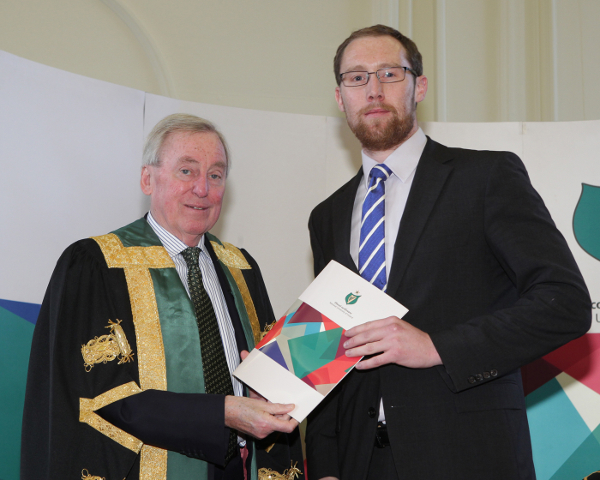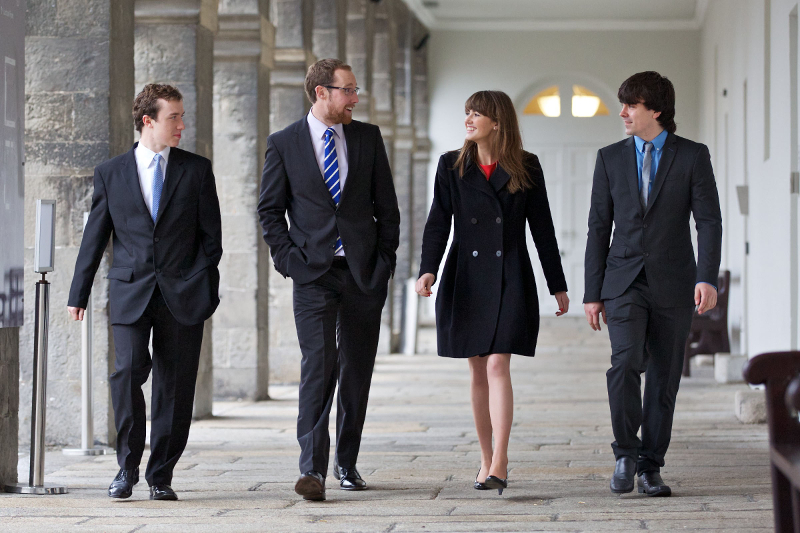
Darragh receiving his Travelling Studentship award from NUI Chancellor Dr Maurice Manning at the 2014 NUI Awards Ceremony
In your experience, what have been the benefits of holding an NUI award?
"Without the financial support provided by
the NUI through my Travelling Studentship,
I simply could not have undertaken my doctoral
research at one of the top law faculties in the world.
This support has allowed me the time, space and opportunity to engage with my research topic
in great depth, to consider it through a range of
theoretical perspectives and to engage with
some of the leading academics and
practitioners in my field."
The most obvious advantage of holding an NUI Travelling Studentship is that it provides a certain amount of financial stability. Without the financial support provided by the NUI through my Travelling Studentship, I simply could not have undertaken my doctoral research at one of the top law faculties in the world. This support has allowed me the time, space and opportunity to engage with my research topic in great depth, to consider it through a range of theoretical perspectives and to engage with some of the leading academics and practitioners in my field. This has enabled me to develop my thesis in a rigorous and detailed manner. Having a Travelling Studentship also gave me the latitude to throw myself into peripheral academic pursuits at Cambridge and elsewhere, which have enriched and enhanced my doctoral studies and made my time as a graduate student both rewarding and foundational to my future career.
As well as financial stability, my award has brought other benefits. In my experience, the NUI Travelling Studentship is a widely recognised and highly respected award. When working in an extremely competitive environment, saturated with highly qualified and accomplished individuals, the Travelling Studentship was something that enhanced my academic profile, added credibility to my work and was another string to my bow when it came to job applications. There are other intangible benefits. As a prestigious postgraduate studentship, for which there is stiff competition, the award of an NUI Travelling Studentship stands as an indication of confidence in the recipient’s work and in his or her potential. The importance of the reassurance that this offers, in course of a ‘PhD journey,’ should not be underestimated.
"the award of an NUI Travelling Studentship
stands as an indication of confidence in the
recipient’s work and in his or her potential. The importance of the reassurance that this offers,
in course of a ‘PhD journey,’ should
not be underestimated."
To be awarded a Travelling Studentship is to join a group of students who – through their scholarly pursuits– have represented the National University of Ireland and its constituent institutions abroad since 1910. For me, this was a source of great pride. It has often acted as a source of inspiration and motivation too. I have been fortunate enough to have been taught and mentored by some wonderful former recipients of the Travelling Studentship. These people have gone on to excel in their careers at home and abroad and have made a real impact in their field. The feeling that I have a link to such a remarkable group of scholars has driven me to demand the best from my own work and to strive to maintain the high standards set by previous NUI Travelling Students.
What advice would you give to prospective applicants to the NUI Travelling Studentship scheme?
Take care when writing your application and supporting documents. Be precise, concise and clear. Make sure to have at least one other person proof read everything. Choose your academic referees carefully; ensure that they know you and your work well enough to provide detailed and informative references. When writing your personal statement, bear in mind the main objectives of the Travelling Studentship Scheme. Most important of all is your research proposal. You need to communicate the nature and content of your proposed project and methodology in a clear and engaging manner. Ensure that the proposal includes the following (as a minimum): (1) what exactly you are proposing to do in your project; (2) why this is important; and (3) how your research fits into the wider academic landscape in your subject area. Your proposal should be sufficiently detailed so that it can withstand interrogation by experts in your area, but written in a sufficiently clear and simple manner so that someone who works in an entirely different field can also understand it and engage with it. If possible send your research proposal to an academic in your area (preferably your potential supervisor) and ask for comments and suggestions.
What have been your major achievements to date?

Pictured at the 2014 NUI Awards Ceremony are, from left Colin Evesson, Darragh Coffey, Maeve O'Rourke and Brian Gaynor. Pic: Stuart McNamara
Throughout my doctoral studies, I have been fortunate enough to attend a number of academic conferences in the UK and Europe, at which I have presented elements of my research. In March 2017, I was one of two Co-Convenors of the Cambridge International and European Law Conference 2017. I have published some elements of my research, which has led to my work being cited by Senior Counsel before the Irish Courts. I have also been invited to speak about my research with members of government and international agencies. I have served as both an executive committee member and the Chairperson of the Cambridge Pro Bono Project and conducted legal research in support of NGOs, International Human Rights Bodies and practitioners instructed in high-profile human rights cases. I have been fortunate enough to engage in teaching undergraduates and providing small-group workshops for students on the Cambridge LLM programme. I will be called to the Bar of England and Wales in Summer 2018. Following this, I will be joining a leading set of Barristers’ Chambers in London as a pupil barrister, where I ultimately hope to develop a public law and human rights-based practice. None of the above would have been possible without the support of the NUI for which I am exceedingly grateful.
In 2018, three NUI Travelling Studentships will be offered in the Humanities and Social Sciences (including Business and Law).
The closing date for applications is Friday 23 March 2018.






















